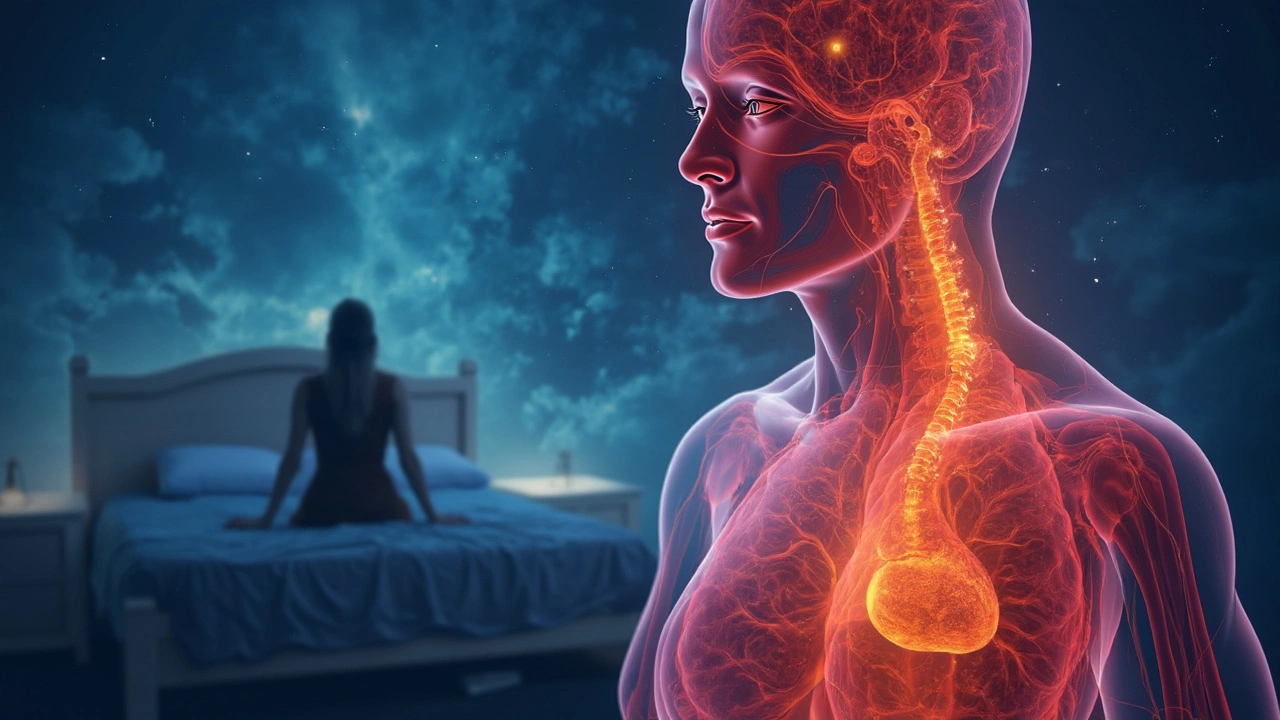Imagine lying in bed completely exhausted, feeling your heart race and the night stretching on endlessly, but sleep just won’t come. That nightmare is daily life for people living with pheochromocytoma, a rare tumor popping up in the adrenal glands. Unlike other conditions where rest simply solves a rough patch, pheochromocytoma can turn every night into a wrestling match with your body’s fight-or-flight system, flooding you with adrenaline at the worst possible time. This tumor isn’t just rare—it’s sneaky, dumping stress hormones and making sleep feel impossible. Most accounts suggest only 2-8 people per million are diagnosed each year, but the experience is so overwhelming it leaves lasting marks on every aspect of life, especially how well you sleep and how drained you feel when the sun rises.
How Pheochromocytoma Hijacks Sleep Patterns
First, let’s break down how things go haywire. The adrenal glands, perched above your kidneys, are like your body’s emergency alarm, pumping out hormones like adrenaline (epinephrine) and noradrenaline (norepinephrine). Pheochromocytomas are tumors that make these glands go into overdrive—think of hitting the panic button over and over for no real danger. Even when you’re perfectly safe, your heart hammers, your mind races, and your body acts like it’s being chased by a wild animal. Naturally, this has a major impact on sleep.
Key hormones normally drop at night so your body can rest. But with pheochromocytoma, there’s no shutdown. Extra adrenaline floods your system, making it tough to relax or drift off. This supercharged state leads to insomnia, night sweats, and restless tossing. In fact, many people describe waking up several times a night, sometimes shaken by anxiety or jolted by pounding headaches. And if that’s not bad enough, morning light doesn’t bring relief. The night-long battle leaves your body out of juice. The kind of fatigue that follows isn’t the normal ‘I stayed up late’ tired; it’s more like your muscles are made of lead.
Symptoms go beyond the textbook: people talk about vivid nightmares, waking up gasping, or their mind racing almost the second their head hits the pillow. Sleep studies on pheochromocytoma patients confirm they spend less time in restorative REM and deep sleep. And those stress hormones? They don’t just mess with your mind—they raise blood pressure, disrupt blood sugar, and send your heart working overtime for hours.
Insomnia is often mixed with paradoxical daytime drowsiness. That’s because even when people finally fall asleep, the quality is so wrecked that they wake up just as tired as when they went to bed. Add unpredictable hormone surges and blood pressure spikes at night, and you quickly see why so many people living with pheochromocytoma feel their sleep has turned into a battleground.
Understanding Fatigue and Daytime Energy Drain
You might think a bad night’s sleep just means a grumpy morning and a need for extra coffee. With pheochromocytoma, it’s another story. Fatigue is a whole-body exhaustion that doesn’t care how much time you spend in bed. These adrenal tumors keep spiking hormones at random times, so even moments of rest feel cut short. The fatigue isn’t just physical; it’s mental fog, bad mood, and an overwhelming urge to hide from the day.
Why does this happen? Every time your body gets those hormone bursts, your heart rate shoots up, your blood vessels constrict, and your metabolism shifts. This means calories burn quicker, the body temperature swings, and cortisol (another stress hormone) climbs higher. The result? Your system never really gets to downshift and recover, even during daytime. By early afternoon, it’s common to hit energy lows so hard people struggle to keep eyes open at work or while driving.
Studies show that up to 60% of those with pheochromocytoma report severe daytime fatigue. And there’s more—persistent hormone surges have been linked to a drop in memory, slower learning, and trouble focusing on simple tasks. Headaches, muscle aches, and even stomach upsets pile on, making the day feel endless. Friends and family sometimes notice these signs first, pointing out the constant yawning, mood swings, or the growing pile of half-done chores. All in all, the hidden exhaustion of pheochromocytoma can be just as life-altering as the roaring insomnia at night.
Some folks try to outsmart the fatigue with caffeine, which seems like a smart fix but isn’t—it ends up making the hormone swings even worse. Others report naps that never actually help and lead to grogginess lasting for hours. So, it’s not just about “getting more sleep,” but finding a way to turn down the body’s relentless stress drive and actually recharge for real.

Proven Ways to Get Better Sleep with Pheochromocytoma
So how do you fight back when your own adrenal glands are the enemy? There’s no magic off-switch, but there are real strategies that can take the edge off, based on what doctors, real-world patients, and sleep experts have figured out.
First up: routine. You can’t control your hormones, but you can train your body to expect sleep at a certain time. Going to bed and waking up at the same hour every single day—even weekends—actually does help. It cues your mind to “wind down.” Some people with pheochromocytoma keep a sleep journal and notice patterns of hormone flare-ups. When I started jotting these down in a plain notebook—not for analysis, just for awareness—I saw my worst nights had a connection to skipped dinners or late screen time.
Next, control your environment. Your bedroom shouldn’t just be dark—think cool, almost chilly if you can stand it. Those hormone surges raise body temperature, so cooler rooms put your body closer to sleep mode. Blackout curtains and white noise machines work wonders for people who are easily startled awake, and even something as basic as a weighted blanket can provide a calming, “anchored” feeling that simulates safety when adrenaline hits.
Screens are a known sleep killer, and with pheochromocytoma, every little trigger counts. I used to scroll on my phone late into the night until Rhea pointed out that the blue light likely amped up my racing thoughts. Switching to a book—an actual paper one—made a surprising difference. Audiobooks, especially those narrated in a calm voice, can help bridge the anxious moments before drifting off. It’s about lowering all the little things that poke at your body’s stress response.
Specific breathing exercises go a long way here. It might sound too simple, but slow exhaled breaths—try counting to four on inhale, six on exhale—help tap the brakes on the body’s adrenaline rush. Guided meditation apps aren’t just trendy marketing; people with pheochromocytoma often use them to reduce midnight panic attacks and quiet down the mind. Don’t expect perfection on night one, but with practice, this stuff really does chip away at insomnia.
Lifestyle Upgrades and Medical Steps to Ease Fatigue
Fatigue isn’t something you can willpower away, especially with an adrenal tumor in play. But with consistency, there are tricks and medical moves that lift you out of the fog, at least enough to reclaim parts of your day.
Nutrition plays a bigger role than most realize. Fast-carb meals—white bread, sugary snacks—make blood sugar crash hard, especially when stress hormones are spiking. Instead, build meals around lean protein, whole grains, nuts, avocados, and veggies. That keeps blood sugar steady, which means fewer rollercoaster crashes. Some people find small, regular meals work better than giant plates. Rhea swears by a handful of pumpkin seeds and a smoothie when post-lunch sleepiness sets in.
Exercise, when done gently, can actually counteract the hormone overload. Low-impact activities like walking, swimming, or a leisurely bike ride burn off excess adrenaline. Just skip heavy workouts right before bed; adrenaline can linger for hours afterward. Morning movement helps set your clock for better sleep; think 20 minutes outside in daylight if you can manage it.
Another point: Be honest with your doctor about sleep and energy. This isn’t just extra tiredness. If you’re struggling, there are specific medications and interventions that can help, like alpha and beta blockers to blunt adrenaline’s effect or—if it’s safe—surgery to remove the tumor. CPAP machines or nighttime blood pressure monitoring might be recommended in severe cases.
Here are some quick, practical strategies that add up:
- Consuming caffeine only before noon, if at all—it sticks around in your system longer when hormones are messed up.
- Sticking to light, early dinners—rich, late meals kick up adrenaline at night.
- Building mini-breaks into your afternoon—get up, stretch, and move to break the fatigue loop.
- Asking family for a bit more patience or backup when you need to nap or step away. Rhea and I have signals—when I hit the wall, she covers dinner, no questions asked.
- Tracking symptom patterns—not obsessively, just enough to spot triggers like stressful workdays, skipped meals, or weather shifts.
Real progress often comes down to hundreds of small tweaks, not one silver bullet. But when all those tweaks add up, you’ll start to feel like yourself again—not just dragging through the day while your pheochromocytoma drags you under. Take a deep breath, give yourself some credit, and keep looking for those small wins. Sleep is complicated, but with the right routines and help, it’s possible to break free from insomnia and never-ending exhaustion—even when your adrenal glands have a mind of their own.


Astro Service
June 12, 2025 AT 06:55This whole post is just woke nonsense. You think a tumor is the problem? Nah. It's because Americans are too lazy to just suck it up. I've worked 16-hour shifts in the desert with no sleep and still ran a marathon. If you can't sleep, get up and do push-ups. No excuses. This country is falling apart because people want magic fixes for everything. Just stop being weak.
DENIS GOLD
June 12, 2025 AT 07:01Oh wow, someone wrote a novel about their bedtime drama. Next up: 'How My Toe Numbness Is Ruining My Life (And 7 Ways to Fix It!)'. Seriously, this is why we can't have nice things. You’re telling me you can’t sleep because your body’s being dramatic? Maybe try not being a hypochondriac. Also, why is everyone suddenly a sleep coach now? Get a real job.
Ifeoma Ezeokoli
June 12, 2025 AT 18:36Oh my heart… I’m crying a little reading this. As a Nigerian woman who’s watched my sister battle adrenal issues, I just want to say: you’re not alone. I’ve sat with people who couldn’t sleep because their bodies felt like they were on fire - and no one believed them. What you’re describing? It’s real. And your small wins? They matter. That weighted blanket? That’s love in fabric form. Keep going. One breath at a time. 🌿💖
Daniel Rod
June 14, 2025 AT 04:16This hit me deep. I used to think fatigue was just laziness… until I saw my brother after his tumor removal. He looked like a ghost who’d been dragged through time. This isn’t just ‘bad sleep’ - it’s your body screaming for mercy. The breathing thing? I tried it. Count to four, six… and for the first time in years, I didn’t feel like I was drowning. I’m not saying it’s fixed. But now I know: healing isn’t loud. It’s quiet. It’s the silence after the storm. 🌊✨
gina rodriguez
June 14, 2025 AT 14:34Thank you for sharing this. I’ve been there - the 3 a.m. panic, the leaden limbs, the guilt for needing to nap. The pumpkin seeds tip? I’m trying that tomorrow. And the part about Rhea covering dinner? That’s the kind of love that saves lives. You’re doing amazing. Small steps count. You’re not failing. You’re fighting. 💪☕
Sue Barnes
June 16, 2025 AT 07:17Stop romanticizing this. If you’re this sick, get the tumor out. No more ‘weighted blankets’ and ‘calm audiobooks’ - those are distractions for people who won’t face reality. Surgery isn’t optional. It’s the only real solution. If you’re still posting about breathing exercises after a year, you’re wasting time. Go see a specialist. Now.